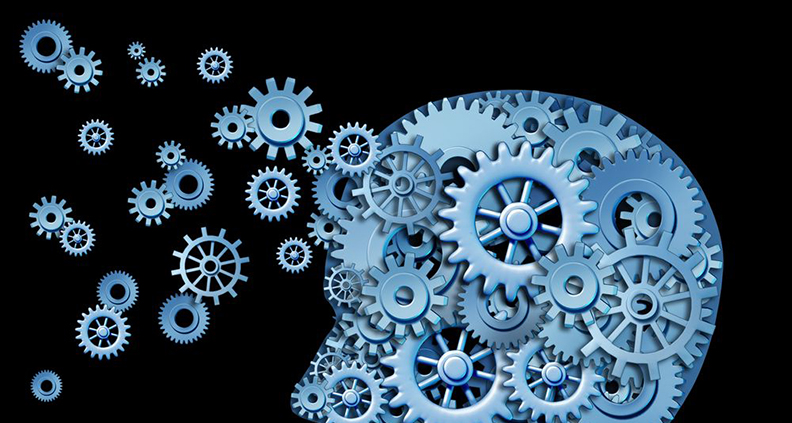
Behavior change is hard, at least for most of us. Even when we know it’s important, we may struggle. In my years of coaching executives, I find that people struggle with change not because they don’t know what to do, but because they have to look at who they are and what they believe.
To explain what I mean, I’ll introduce you to David, an executive who was stuck. My hope is that some of his challenge will resonate with you and give you ideas on how to get unstuck. Applying these ideas will certainly increase your odds of success. First, a little background on how our brains work.
How the Brain Works
Most of us believe that we are fairly conscious about the decisions and choices we make, when in reality, our life experiences have programmed our brains to think, anticipate and respond in ways—both positive and negative—that are consistent with our pasts. Our brains have the amazing capacity to constantly learn, organize and then store vast amounts of information into a “library” that can be referenced later as needed. A lot of this information is stored in our unconscious minds.
The brain is also very efficient. Scientists estimate that we filter 400 billion bits of information per second and that we may be aware of about 2,000 of them. Our library of stored information helps the brain determine what to bring to our attention and filters out the rest. Of course, you can tell your brain to focus upon something in particular and it will, but most of the time it carries on without your conscious involvement.
Beliefs are part of our library. They are learned and often become hard-wired into our unconscious minds. For example, if you believe that people are untrustworthy, it will be very hard for you to behave in ways that demonstrate trust in others. Instead, your brain will look for evidence that people are untrustworthy to prove you right. There may be ample evidence of trustworthiness, but your attention will focus on the few bits of information that fit into your library of beliefs. We unconsciously look for data that reinforces what we already know to be true – even if it isn’t.
David, the Disorganized Executive
Let’s return to David, an executive whom I was coaching. When I met him, his goal was to get organized and stay organized. He believed that his lack of organization was negatively impacting his chances for promotion, and he was frustrated with himself. He had a strong desire to change but “had tried everything and nothing worked.” David could see the practical value of most of the strategies and tactics he had tried, but none of them worked for him. He declared, half-joking, that he must be missing the “organization” gene.
Belief Trumps Desire
David believed that he was destined to lead a disorganized life. He had told himself so many times that he was disorganized that he was “living into” the vision he had created. His brain was actually helping him prove what he believed to be true.
The messages we consistently tell ourselves become part of our library of beliefs. This negative messaging also creates negative energy, and negative energy depletes our reserves, produces stress and keeps us trapped in unproductive behaviors. Your brain believes what you consistently tell it. Regardless of how much you say you want to change, if you really believe you can’t, you can’t. That’s what was happening to David. His negative belief trumped his desire.
As David’s coach, I helped him become more aware of his negative thoughts and negative energy. We took two approaches. The first was to have him complete the Core Centric Index, an assessment that measures the level of consciousness in our decision-making. From this, David was able to see when and how he was holding negative energy and what its impact was upon his work and his personal life.
Second, David kept a log of when he was thinking negative thoughts about himself and telling himself he was disorganized. This wasn’t easy for him, and it seemed tedious at times. Once he started to recognize the frequency of his negative thoughts, however, he was able to catch himself and stop. He also began to replace the negative thoughts with simple, true statements that were positive. He liked to use, “I am becoming more organized.”
You Will See What You Are Looking For
As I observed how David worked throughout the day, I noticed that his work habits had elements of structure and discipline and that in some ways he was organized. There was certainly room for improvement, but he wasn’t the disaster he had portrayed. His focus, however, was only on his disorganized behaviors. When I asked about the positive things that I observed, he dismissed them as flukes or trivial. He was so focused upon the negatives aspects of his behavior that he could not see his strengths.
In David’s case, his brain was helping him see what he was looking for – the familiar disorganization. The brain was finding evidence to support and reinforce his belief. Until he could re-focus his attention – and literally re-learn what to see – he would be stuck.
In coaching David, I wanted him to be more conscious about what he was doing. To start, we created a list of all the activities that would comprise “to be organized.” He then rated himself on how frequently (never to always) he did or did not do the things on the list. To his surprise, he was doing a lot of things he needed to do—he just wasn’t conscious of it. The list also helped him identify where he needed to improve, which enabled him to set priorities and a timeline. (A good start to getting organized!)
Connecting the Dots
I wanted David to associate and anchor the work he was doing with positive future outcomes. I asked him to talk about what it would be like, what would be different and how he would feel, when he achieved his goal. We were creating a new vision for him to “live into” that would replace the old one. We created an informal document of everything he’d identified, and he committed to reading it every day on his commute in to work.
During this brainstorming session, David said something very interesting: if he were truly organized, he would have to deal with a career decision he had been avoiding. David realized that unconsciously, he had used his disorganization as an excuse, and negative talk to reinforce his situation. He thought his disorganization was a personality quirk. Now it seems to be a self-imposed diversion to avoid responsibility and action. This realization was sobering, but motivating. David’s goal was to get organized and stay organized. The answer wasn’t just more strategies and tactics. David knew how to be organized. What made it possible for him to untangle his situation was his willingness to question his beliefs, to let go of negative energy and to take responsibility for his thoughts and actions. Once he started to address these issues, he could put his logical mind to work on getting organized, and his struggle began to fade away.
David’s success did not happen overnight and, like most of us, he couldn’t do it on his own. It’s hard to be objective about yourself, in part because of the way the brain works. David was committed to the process even when it seemed tedious or when he’d get discouraged. He gave himself the time and attention needed to re-train his brain to work in new ways for him. David was able to achieve his goal. The real payoff, he said later, was feeling more in control, more positive and more confident, which helped him re-launch his career.
Summary
Much of our behavior is unconscious. We think we are aware of everything going on around us, but our conscious mind gets only a fraction of what’s really there. There is always more information available; we just have to ask our brains to look for it.
We grow up believing certain things about others, the world and ourselves that may limit us from reaching our potential. These beliefs, however, are man-made. So if a belief no longer serves you, you can change it.
If we hold negative energy, it will limit our potential to grow. Negative self-talk is a common example, but only one of many. Energy is contagious. Our negative thoughts and actions not only hurt us, they impact others as well. Our brains never lose the capacity to learn, adapt and change. So we can re-train our brains to work in new ways for us. It takes attention, time and commitment. We have to be willing to question our beliefs and to get serious about what we are willing to do (and give up) to get what we say we want.
After all is said and done, being stuck is largely about what we’ve told ourselves. And that is a choice we get to make every day.
Susan Germaine is an executive coach, consultant and trainer. Her consulting firm, Germaine Consulting LLC, helps companies design strategies to foster employee engagement. As an executive coach, she has spent over 1,800 one-on-one hours working with CEOs, business owners and other executives, helping them realize their leadership potential. She is a former Accenture executive specializing in Change Management.




